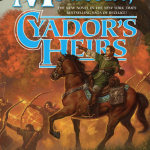Cyador’s Heirs is the latest outing in L.E. Modesitt Jr.’s long-running cash cow, the Recluce series. If you’ve not read the Recluce series, and you like fantasy, you should probably go find The Magic of Recluce (the first book in the series) and see if it is to your taste. I found it strikingly original when I first read it (when it was new), and I’ve enjoyed it a number of times since. These days, the Recluce novels are among... Read more
















